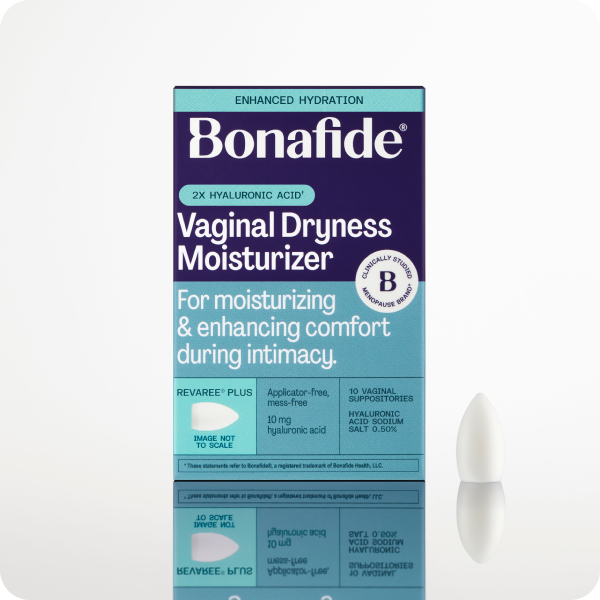More than half of women going through menopause experience vaginal dryness—also known as genitourinary syndrome of menopause (GSM)—but only around 10% seek relief from their symptoms.1
This means that the majority of women navigating menopause are struggling silently with uncomfortable, and oftentimes painful symptoms that impact not only their sexual health and wellness, but also many aspects of their everyday life. Vaginal dryness can have negative effects on intimacy, comfort, and overall quality of life. Fortunately, there are options for managing vaginal dryness during menopause and beyond.
While there are many “natural” remedies being touted for the management of vaginal dryness, one ingredient demonstrating promising results is sweet almond oil, which is occasionally utilized in a lubricant or moisturizer.
In this article we explore what causes vaginal dryness during menopause to begin with, as well as how some women are using sweet almond oil as an ingredient to help manage their vaginal dryness and the elements it contains that make it a viable symptom management option.
What Causes Vaginal Dryness During Menopause?
While hot flashes are one of the more well-known symptoms of menopause, vaginal dryness is another that’s not considered uncommon, but definitely is less talked about. When left unmanaged, vaginal dryness and its associated symptoms can become chronic and progressive2— but what exactly causes it?
As we approach menopause, our estrogen levels become volatile and eventually, significantly decline. This can lead to vaginal tissue becoming thinner, less elastic, and more susceptible to tearing.3 And as these estrogen levels fall, so does the body’s natural ability to create vaginal lubrication to keep tissue moist and supple.4 This can lead to pain during sex, as well as itching, burning, and discomfort during everyday life.
Fortunately, symptom management options exist and there are helpful ingredients to look for in the products you consider. Enter— sweet almond oil.
What is Sweet Almond Oil and What is it Used For?
Almond oil is the byproduct of pressing or grinding almonds, sometimes in addition to heat or chemical solvents for refinement.5 Manufacturers commonly include sweet almond oil in products that are specifically designed to address dry skin or chronic skin conditions, such as eczema, as it acts as both a moisturizer and emollient.6
As a moisturizer, sweet almond oil works to condition and soften the skin.7 As an emollient, it helps to fill in the crevices of rough, cracked, dry skin and locks in moisture. This makes sweet almond oil an ideal solution for those experiencing dryness, irritation, and itching of the skin.8
Additionally, sweet almond oil contains vitamin E, an antioxidant that helps to improve skin elasticity and aids in protecting it from radical damage – it can also act as an anti-inflammatory.9 While humans have been using almond oil as a moisturizer topically for years, some now suggest using sweet almond oil as part of a moisturizing regimen for vaginal dryness, which may work to help manage the symptom set.10
How Sweet Almond Oil is Used for Vaginal Dryness
Some women may opt for estrogen cream or prescription medications to help manage vaginal dryness and its associated symptoms. Others, however, may prefer a non-drug approach that avoids the use of hormones or parabens.
Natural almond oil is an ingredient in some topicals that is technically safe to be used around the vulva and inside the vagina to help address vaginal dryness and the thinning of vaginal tissue that is often associated with the menopause transition.11 If you’re choosing to use a product containing sweet almond oil as either a lubricant or vaginal moisturizer, ensure you don’t use it with latex condoms, sex toys, or diaphragms —it can increase the risk for pregnancy or infection as it can potentially degrade the quality of these materials.12
It’s also recommended to verify that the almond oil that’s being used is naturally derived and considered “sweet almond oil”. “Bitter almond oil” is fragrant and is more often used in soaps, aromatherapy, and massage, while sweet almond oil is commonly used in moisturizing skin care products.13 Be sure to check all your product ingredients first to ensure sweet almond oil is being used.
Out of an abundance of caution, avoidance of almond oil in any form if you have a nut-allergy and are allergic to almonds is prudent. If you have any specific concerns or questions, we also recommend checking-in with your healthcare provider before using any products containing this type of oil.
You can find natural sweet almond oil at many pharmacies and health food stores, however, there are existing products available specifically designed to address vaginal dryness that incorporate sweet almond oil as one of its key ingredients.
Consult With Your Doctor or Healthcare Provider
Vaginal dryness is not uncommon during menopause, but it doesn’t have to be your new normal.
As mentioned, it’s important to consult with your healthcare provider before incorporating any new product into your routine, especially when seeking to manage vaginal dryness and its associated symptoms. Your provider can help rule out any underlying issues, discuss your options, and narrow down a management approach that works best for you.
Resources
- https://www.health.harvard.edu/womens-health/dont-ignore-vaginal-dryness-and-pain
- https://www.webmd.com/menopause/menopause-vaginal-dryness#:~:text=Unlike%20hot%20flashes%2C%20your%20dryness,time%2C%20not%20just%20during%20sex.
- https://www.menopause.org/for-women/sexual-health-menopause-online/changes-at-midlife/changes-in-the-vagina-and-vulva#:~:text=After%20menopause%2C%20when%20levels%20of,tearing%2C%20and%20bleeding%20during%20intercourse.
- https://www.menopause.org/for-women/sexual-health-menopause-online/changes-at-midlife/changes-in-the-vagina-and-vulva
- https://www.medicalnewstoday.com/articles/almond-oil-for-skin#what-is-it
- https://www.ncbi.nlm.nih.gov/pmc/articles/PMC5796020/
- https://nationaleczema.org/blog/get-the-facts-almond-oil/#:~:text=Like%20other%20topical%20oils%2C%20such,relieve%20and%20repair%20flaring%20skin.
- https://nationaleczema.org/blog/get-the-facts-almond-oil/#:~:text=Like%20other%20topical%20oils%2C%20such,relieve%20and%20repair%20flaring%20skin.
- https://www.healthline.com/health/food-nutrition/almond-oil#:~:text=Almond%20oil%20is%20full%20of,anti%2Dinflammatory%20and%20boosts%20immunity.
- https://www.menopausecentre.com.au/information-centre/articles/vaginal-dryness-what-it-is-and-how-to-treat-it/
- https://www.uhn.ca/PatientsFamilies/Health_Information/Health_Topics/Documents/Know_How_to_Use_Vaginal_Moisturizers_Lubricants.pdf
- https://www.healthgrades.com/right-care/womens-health/vaginal-lubricants-types-benefits-how-to-use
- https://www.verywellhealth.com/almond-oil-for-skin-5083921










Comments
Post commentVery interesting and helpful
Thank you
I would look forward to learning more about this.
Thank you